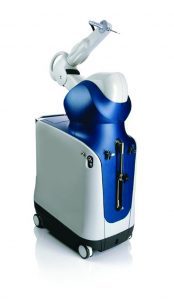Surgeon uses robot at Venice Regional Bayfront Health for partial knee replacement

She’s 80 years old, and her arthritic knee hurts constantly. She’s using a cane or walker now, and can’t do daily walks with friends. Her knee is just too painful.
Total knee replacement is an option, but she can’t stand the thought of being hospitalized for days, or going through months of painful physical therapy to make an artificial knee serviceable at her age.
But there is another option.
It’s called partial knee replacement (PKR), and surgeon Joseph Noah, M.D., uses a robot at Venice Regional Bayfront Health to perform what is usually an outpatient procedure.
“This minimally invasive, robotic surgery lets us remove and replace only the diseased or damaged part of the knee. It’s where engineering design meets orthopaedic surgery,” said Dr. Noah, a board-certified orthopaedic surgeon. He specializes in sports medicine at Suncoast Orthopaedic Surgery & Sports Medicine in Venice.
For many people with partially damaged or diseased bone in the knee, this robot-guided surgery can be life-changing.
Here’s how it works.
The patient undergoes a preoperative CT scan. A technician loads the CT data into a computer, and the information is reviewed with the surgeon to create a preliminary surgical plan. In the operating room, the computer directs the surgeon to map out the patient’s knee using a probe that transmits the information to the computer navigation system.
“We end up with a very reliable, three-dimensional model of the patient’s knee, in much the same way that engineers design products today, or an architect designs a building,” Dr. Noah said.
With the design programmed into the robot’s computer, the surgeon guides the robot’s surgical arm to make cuts by the millimeter. He saves healthy bone and removes only damaged bone. Then he implants the artificial partial knee. The entire procedure takes less than an hour and a half.
Not everyone is a candidate for PKR. Dr. Noah said it is not suitable for people with massive deformities or extensive knee damage from arthritis or injury. Some medical conditions may also prohibit the surgery. But for many individuals, it’s a viable option to consider, rather than living with pain and limited mobility.
“A total knee replacement requires multiple days in the hospital, months of recovery time, and sometimes even a blood transfusion,” Dr. Noah said. “In contrast, patients receiving PKR usually go home the same day and return to normal activities much faster. The partial knee also feels more like the patient’s natural, healthy knee. Artificial knees always feel different and generally don’t deliver normal movement.”
“Robot-assisted partial knee replacement is an effective option for people who have put off dealing with knee pain because they thought their only choice was a total knee replacement,” he said. “This surgery is restoring people’s mobility. It’s life-changing.”
Joseph Noah, M.D., is a board-certified orthopaedic surgeon specializing in sports medicine. He performs robotic surgery for partial knee replacement at Venice Regional Bayfront Health.
Photo Courtesy of Venice Regional Bayfront Health
Venice Regional Bayfront Health
Call 941.485.7711 or visit VeniceRegional.com









